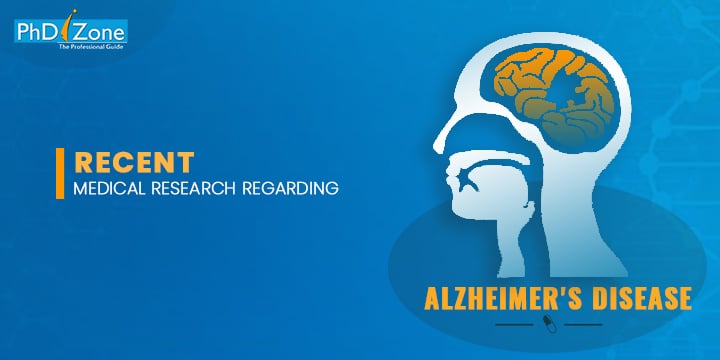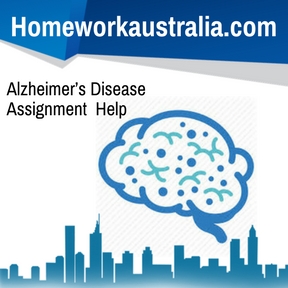
What are the Symptoms of Alzheimer's Disease?
· However, our nursing assignment experts have illustrated 10 signs of Alzheimer's disease. They are - Memory loss Difficult to plan and follow that action plan Problem with concentration Misunderstanding the passage or losing track of dates Vision problems Repetitive conversations Difficult to find lost items Poor Judgment · In most of the cases, Alzheimer’s disease affects the part of the brain that deals with the learning process. With the increase in intensity, the patient experiences change in mood, behavior, disorientation, confusion about time and place of events. The symptoms of Alzheimer’s disease also include forgetting the names of friends and family · Alzheimer’s disease generally means memory loss and the decrease of intellectual capabilities in a degree that interferes with the daily life of a patient. Unlike many people tend to think, Alzheimer’s disease is not a normal part of aging, although the majority of people suffering from it are above 65 years old; however, there are cases when people in their 50s or

�� Good Alzheimer’s Disease Research Topics & Essay Examples
· Alzheimer’s disease generally means memory loss and the decrease of intellectual capabilities in a degree that interferes with the daily life of a patient. Unlike many people tend to think, Alzheimer’s disease is not a normal part of aging, although the majority of people suffering from it are above 65 years old; however, there are cases when people in their 50s or Alzheimer’s disease is a permanent, progressive brain disorder that gradually destroys memory and thinking skills, and ultimately the capability to carry out the simplest tasks. In most people with Alzheimer’s, symptoms first appear in their mids. Estimates differ, but experts recommend that more than 5 million Americans may have Alzheimer’s · Alzheimer’s disease is the most frequent form of dementia that is characterized by extensive deterioration of memory, speech, behavior, and thinking faculties. Seven Stages of Alzheimer’s Disease It has been established that social and mental-stimulating activities are critical in reducing risks associated with the Alzheimer’s disease

Article 1: Alzheimer’s Disease.
· Alzheimer’s disease is the most frequent form of dementia that is characterized by extensive deterioration of memory, speech, behavior, and thinking faculties. Seven Stages of Alzheimer’s Disease It has been established that social and mental-stimulating activities are critical in reducing risks associated with the Alzheimer’s disease · Basically, Alzheimer’s happens by deposition of some unwanted proteins around the cells of the brain. These proteins are called Amyloids. The deposit and form plaque around the cells. Thus, the person’s, sensory part is affected. The transmitters called the neurons, that give messages to the body start decreasing · However, our nursing assignment experts have illustrated 10 signs of Alzheimer's disease. They are - Memory loss Difficult to plan and follow that action plan Problem with concentration Misunderstanding the passage or losing track of dates Vision problems Repetitive conversations Difficult to find lost items Poor Judgment

References
· In most of the cases, Alzheimer’s disease affects the part of the brain that deals with the learning process. With the increase in intensity, the patient experiences change in mood, behavior, disorientation, confusion about time and place of events. The symptoms of Alzheimer’s disease also include forgetting the names of friends and family · Alzheimer’s disease is the most frequent form of dementia that is characterized by extensive deterioration of memory, speech, behavior, and thinking faculties. Seven Stages of Alzheimer’s Disease It has been established that social and mental-stimulating activities are critical in reducing risks associated with the Alzheimer’s disease · Article 1: Alzheimer’s Disease. The article basically talks about various facts about the disease including; its epidemiology, risk factors, diagnostic criteria, mode of presentation, management and treatment procedures and prevention measurers. The disease is identified as the most prevalent form of cognitive degeneration with a high prevalence
How does Alzheimer's disease affect the brain?
· Article 1: Alzheimer’s Disease. The article basically talks about various facts about the disease including; its epidemiology, risk factors, diagnostic criteria, mode of presentation, management and treatment procedures and prevention measurers. The disease is identified as the most prevalent form of cognitive degeneration with a high prevalence · Basically, Alzheimer’s happens by deposition of some unwanted proteins around the cells of the brain. These proteins are called Amyloids. The deposit and form plaque around the cells. Thus, the person’s, sensory part is affected. The transmitters called the neurons, that give messages to the body start decreasing Alzheimer’s is a term used for memory loss, the most frequent type of dementia and other intellectual skills serious enough to interfere with daily life. Alzheimer’s is not a normal element of aging, although age is increasing, as well as most individuals with Alzheimer are older than Moreover, Alzheimer is not only a disorder of old blogger.comted Reading Time: 6 mins
No comments:
Post a Comment